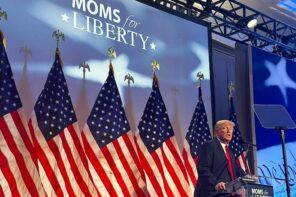In the midst of an intra-evangelical dispute over whether Ted Cruz is indeed consolidating the support of influential evangelical leaders, supporters of Marco Rubio’s campaign are trying to make the case that his appeal to evangelicals is fundamentally different from Cruz’s, and that Cruz doesn’t have a lock on evangelical voters.
At the heart of this simmering stand-off is the divide between evangelicals who hew to, for lack of a better characterization, the David Barton view of America, and those who would instead favor a president who, in their telling, merely relies on his faith in making decisions. That is, those in the latter camp don’t want to hear paeans to the Christian nation, or debunked pseudo-histories of the Founding Fathers, or claims that only a certain candidate or another will bring about the revival the country desperately needs. (Barton, as I reported earlier this week, is a Cruz supporter, much to the chagrin of evangelicals embarrassed by his revisionist history about the “Christian nation.”)
“There is a faction,” said Eric Teetsel, Director of Faith Outreach for Rubio’s campaign, referring to the Barton camp, “who believe politics is the means to achieve spiritual revival and the sort of cultural revitalization that would inevitably follow.” Teetsel contends that many evangelical voters reject that approach, and “aren’t looking for a pastor in chief. Rather, they want to know that a candidate has a personal relationship with Jesus and relies on prayer, the Bible, and the leading of the Holy Spirit when making decisions.” Rubio recently released a campaign ad devoted to showcasing the role of faith in his life and politics.
“Rubio’s biblical values are the foundation of his leadership,” Teetsel told me, “and a means through which he seeks the welfare of this his temporary home by crafting policy that is just and maximizes the potential for human flourishing.”
That is, no doubt, a deeply conservative view of both religion and politics, and no one should be fooled into thinking Rubio is a moderate, or a secularist, or that he aims to excise Christianity from the heart and soul of Republican politicking. To outsiders, then, this Cruz-Rubio divide may seem like a distinction without a difference: after all, both advocate an intertwining of conservative Christianity and politics, and there’s not much policy daylight between the two candidates. Both oppose marriage equality. Both oppose abortion. Both describe religious liberty as under threat by marriage equality, and by, for example, the contraception coverage requirement in the Affordable Care Act. Rubio told NBC’s Chuck Todd in December that although he wouldn’t favor a constitutional amendment to overturn Obergefell v. Hodges, which guaranteed marriage equality, he would try to undo the case through Supreme Court appointments. “I don’t believe any case law is settled law,” he said. “Any future Supreme Court can change it. And ultimately, I will appoint Supreme Court justices that will interpret the Constitution as originally constructed.”
As I reported last March, this gap between the hardcore Christian nation revivalists and the kinder gentler religious right is not new. At that time, in an example of just how volatile and unpredictable this primary has been, many evangelicals believed Scott Walker would fulfill the role of the not-too-culture-warrior-ish presidential candidate.
Now it looks like Rubio is beginning to fill that role, particularly because Jeb Bush, who might have, is floundering, and because there is no other alternative with Donald Trump and Cruz sitting atop the polls. The question is whether the Rubio-supporting dissenters to the Christian nation orthodoxy constitute a sufficient bloc within the religious right to vanquish both Trump, who has scrambled the religious right playbook, and Cruz.
At WORLD, a leading magazine of evangelical news and opinion, J.C. Derrick reports that other evangelical leaders dispute the claim of a December 21 Washington Post article that “conservative Christian activists whose support has been hotly pursued by Republican presidential candidates have begun to quietly coalesce around” Cruz, based on endorsements from Focus on the Family Founder James Dobson, National Organization for Marriage president Brian Brown, and Iowa religious right activist Bob Vander Plaats.
Warren Throckmorton, a leading evangelical critic of Barton, calls the claim that Cruz is leading in evangelical endorsements “Christian astroturf.”
Pro-Rubio evangelicals, said Thomas Kidd, a historian at Baylor University and a member of the Rubio campaign’s Religious Liberty Advisory Board, “tend to be younger and more cautious about the Christian Right’s excesses during the Moral Majority era.” (Kidd says he hasn’t formally endorsed Rubio, “but I have a favorable view of his candidacy.”) Kidd identified immigration as the principal policy divide between the two candidates. While pro-Rubio evangelicals are “concerned about border security, they do not want to alienate Hispanics, and they want to be realistic about handling the presence of the millions of undocumented immigrants already here,” some of whom attend church with them.
Another lens through which to view the Cruz-Rubio divide is to contrast their views on the conspiratorial specter of sharia law. As David Weigel reports at the Washington Post, Rubio, when asked by an Iowa voter about sharia law coming to America, “swiftly pronounced that this was ‘not going to happen.'” Cruz’s reaction to a voter question about the prospect of sharia courts was to claim “there have been instances” and to promise to “do whatever is necessary to prevent” sharia law from coming to America.
The Rubio supporters are clear-eyed about the popularity of Barton and other Cruz-supporting evangelicals. Kidd, also a Barton critic who covered controversies about him for WORLD, told me, “Cruz’s connection with David Barton certainly suggests that, in spite of Barton’s tarnished reputation, there is still a great deal of sympathy for the ‘Christian America’ narrative that we used to be a uniformly Christian nation, and that we need to get back to being one.” But, he maintained, “the Barton model is surely becoming less common, though – you would find virtually no support for it in the leadership of the Southern Baptist Convention, for example,” and younger evangelicals are finding it less appealing.
In 2004, the Republican National Committee hired Barton to help with evangelical get-out-the-vote efforts. A little over a decade later, he’s supporting a presidential candidate who claims to be an outsider to the Washington establishment, and mainstream evangelicals are dismissing him as a fraud. The RNC, if it is indeed looking for a so-called establishment candidate to emerge from the 2016 field, might just regret having helped make Barton an evangelical celebrity.




